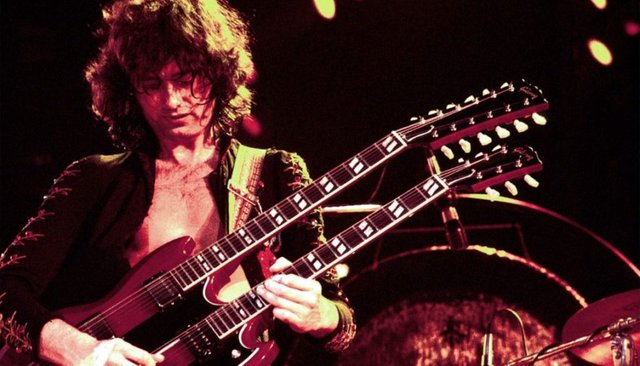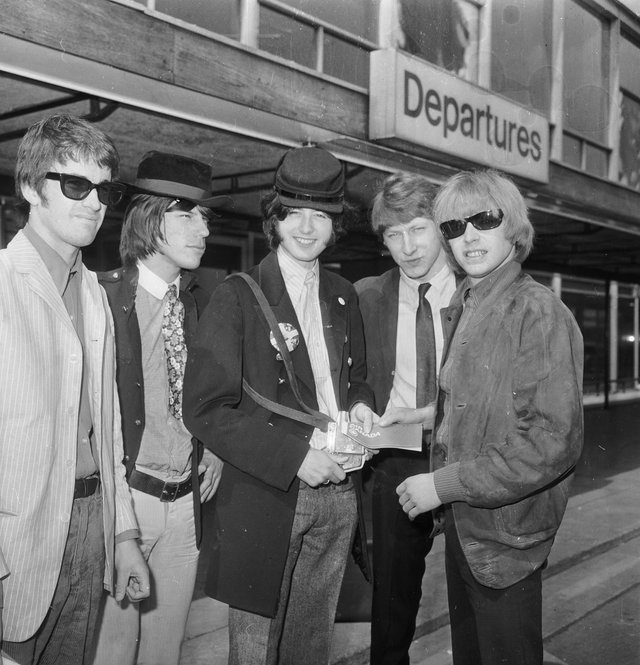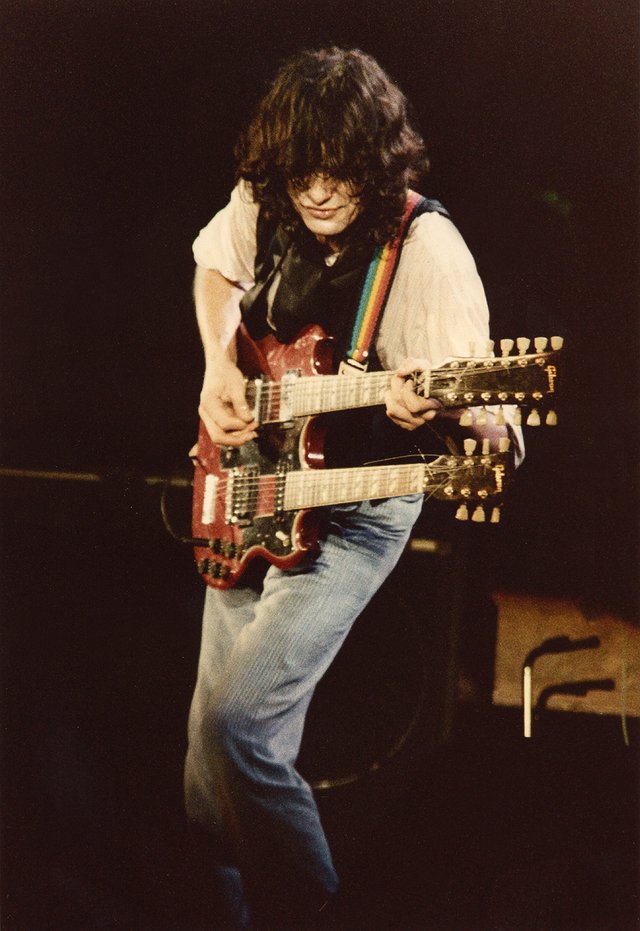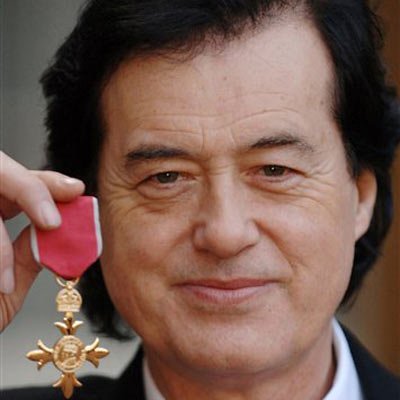Led Zeppelin: Part 4, Jimmy Page
Jimmy Page is one of the greatest guitarists of all time. As the founder and driving force behind Led Zeppelin, he became an international star.

Image credit
In Led Zeppelin: Part 3, Led Zeppelin II which is about the making of Led Zeppelin's second album, Jimmy Page was the person who put it all together as guitarist, songwriter, organiser and producer.
The importance of Jimmy
It's no exaggeration to say that without Jimmy Page, there would not have been a Led Zeppelin. As we have seen in the previous parts in this series, Jimmy Page formed the band and chose its members, funded their first album and tours, arranged and produced the albums and gave Led Zeppelin its distinctive sound.
Jimmy Page is one of the greatest guitarists of all time (if not the greatest, in my opinion). In a recent poll with more than 70,000 votes cast, Jimi Hendrix topped the list, followed by Jimmy Page, Eddie Van Halen, David Gilmour, Eric Clapton and Stevie Ray Vaughan. Is that a fair reflection? I'm not sure, but Page is in the top three or four of almost any poll.

Jimmy Page, 1958. Image source
Page boy
James Patrick Page was born on 9 January 1944, in Heston, West London. When they moved to a new house in Epson, Surrey in 1952, he found a guitar left behind there. So he started playing the guitar at the age of 12, and although he took some lessons he was largely self-taught by listening to records.
By the age of 13 Page was good enough to appear on a BBC talent quest programme in a skiffle quartet. He took his guitar along with him everywhere he went, including to school where it was routinely confiscated and then given back to him after school.
Although he professed to want to be a biological researcher—and even interviewed for a lab assistant job—he left school at 15 to pursue a musical career.
He played with a number of bands, but there was nothing regular until he was asked by Neil Christian to join his band, the Crusaders, after seeing him perform in a local hall. He toured with Christian's band for two years and played on several of their records. But he fell ill with glandular fever and had to stop performing. So he enrolled in an art college to concentrate on painting, his other passion.

Jimmy Page working as a session musician, 1963. Image source
Session musician
While still a student, Page frequently performed at the Marquee Club where fellow guitarists Jeff Beck and Eric Clapton also performed. He was spotted by Columbia Records and was offered a position as a session musician. At first, he was the “spare” guitarist when a band didn't have one or didn't pitch up. Session work normally requires you to be able to read music, which Page could not. But he was very quick at picking up songs and became a favoured guitarist. He recorded with the Who, the Kinks, Marianne Faithful (As Tears Go By), the Rolling Stones, Petula Clarke (Downtown), and many others.
He went to producing tracks for a host of artists such as John Mayall and Eric Clapton. He started composing music recorded them with various artists. He jammed with artists such as Keith Richards (available on bootleg).
All in all, being a session musician gave him an excellent schooling.

Jimmy Page before playing his first gig with the Yardbirds, 1964. Image source
The Yardbirds
The Yardbirds is often referred to as the nursery of great guitarists. Eric Clapton joined the band in 1963, the year of its formation. The band gained fame for its rhythm and blues sound and brought the Chicago blues sound to the UK. Their first big hit was For Your Love, in 1965.
Eric Clapton left the band in early 1965 and the job was offered to Page. Page had stood in as a guitarist for the band on many occasions so knew them well. But his career as a session musician had become very lucrative and he was worried about his health under touring conditions. So he suggested his friend, Jeff Beck. But after a Yardbirds concert at Oxford, he went backstage and offered to replace bassist Paul Samwell-Smith, who was leaving the band. He soon moved from bass guitar to lead, together with Jeff Beck.
But the band was riven by inter-personal conflict, probably fueled by their lack of hits. Although their studio work was quite commercial, it was the concerts that really saw Page shine as the music got heavier and more experimental—something he would take directly into Led Zeppelin.

Jimmy Page, 1983. Image: WikiCommons
Post-Led Zeppelin
Led Zeppelin broke up as a band in 1980, following the death of drummer John Bonham. This affected Page very deeply and he refused to touch a guitar for some time. When he did resume work, he spent most of the '80s in short-term collaborations with the bands the Firm and the Honeydrippers. He also worked on movie soundtracks and reunions with old band-members.
In 1988, Page released a solo album, Outrider, to which Robert Plant contributed. In the same year, Page returned the favour by appearing on Plant's solo album, Now and Zen.
Collaboration with Plant continued through the '90s, particularly with their 1994 appearance on the penultimate performance of MTV's Unplugged series. The 90-minute special, called Unledded, was brought out as a CD and later as a DVD, No Quarter Unledded.

James Patrick Page, OBE, 2005. Image source
The honours
Page received his OBE in 2005 for his charity work in Brazil—and for which he received honorary Brazillian citizenship.
In 2010, Page was honoured with the first Global Peace Award by the United Nations' Pathways to Peace organisation and performed in the Show of Peace Concert in Beijing, in October of that year.
In 2014 he was given an Honorary Doctorate at the Berklee College Of Music.
Jimmy Page has had a huge influence on countless rock bands and guitarists that followed after him. As Brian May of Queen said,
I don't think anyone has epitomised riff writing better than Jimmy Page. He's one of the great brains of rock music.

Jimmy Page, 2018. Image source
Previous posts in this series:
Led Zeppelin: Part 1, The Making Of
Led Zeppelin: Part 2, The First Album
Led Zeppelin: Part 3, Led Zeppelin II
References:
Biography: Jimmy Page
AllMusic: Jimmy Page
JimmyPage.com
Wikipedia: Jimmy Page
Guitar Noise: Jimmy Page - Music Biography
Ultimate Guitar: Jimmy Page: What I Learned From Being a Session Musician
Led Zeppelin: Jimmy Page
Also posted on Weku, @tim-beck, 2019-02-07